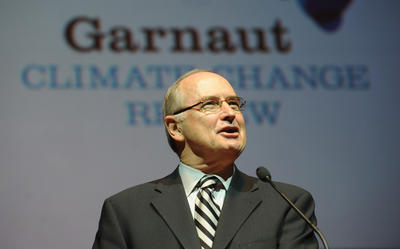And yet, this time the stars may come into alignment. Action on climate change is important to the independent members of Parliament who elevated it to a headline issue in their deal to support the government, as well as to the Greens who will be casting the deciding votes in the Senate from the middle of the year. Key sticking points that need to be resolved include
- how to bridge the gulf between the government and the Greens on Australia’s emissions target;
- how to design carbon pricing, given the target debate, uncertainty about international emissions trading opportunities, and calls by industry for price certainty;
- how to square the competing demands for revenue from carbon pricing; and
- how to comprehensively engage the rural sector.
For the target, the pragmatic solution may turn out to be deferring the decision, although the Copenhagen pledges by major countries suggest a target for Australia that is more ambitious than the government’s current commitment yet less than the Greens’ demand. For carbon pricing design, a fixed-price permit system that allows a later shift to market trading, as suggested by the 2008 Garnaut Review, is receiving increasing support.
A more fundamental question for Australian policymaking over the last two decades has been whether decisive action on climate change is in Australia’s interest, and whether Australia should lead or lag the global effort. Australia is in a unique position, given it is a large exporter of carbon-intensive energy and so stands to lose from global climate action, but is also extremely vulnerable to climate change including extreme weather events that result in flooding or bushfires.
The Garnaut Review’s first Update paper, released this week, reinforces the conclusion from the 2008 Review that strong global climate action is in Australia’s interests, because the benefits from avoided climate change outweigh the costs.
The paper is the curtain raiser for a series of eight topical Update reports to be released over February and March, tackling the issues of the international mitigation framework, global emissions trends after the financial crisis, carbon sequestration in agriculture and forestry, the latest in climate change science, how to reduce Australia’s emissions, the role of innovation, and transformation of the electricity sector.
The papers are written from an Australian perspective, but the issues are relevant elsewhere in the world. They will help inform policy makers in the Asia Pacific region and beyond — as can the actual outcome from Australia’s fresh go at climate policy.
Frank Jotzo is Director of the Centre for Climate Economics and Policy at the Crawford School of Economics and Government at the Australian National University. He advises the Garnaut Review Update.


It does not appear to be clear why the following is the case:
“For carbon pricing design, a fixed-price permit system that allows a later shift to market trading, as suggested by the 2008 Garnaut Review, is receiving increasing support.”
One would have thought that a carbon tax has increased its likelihood in Australia following the political development of the hung parliament and the role of the Greens with its preference of a carbon tax and no subsidies to big polluters.
And arguably, a carbon tax is superior to a trading scheme where some emissions are hard to be included in a scheme and the very high costs involved in any trading schemes. The fixation with trading schemes is irrational.
Secondly, while Professor Garnaut has made a strong argument that Australia’s action will be in its interests, yet many Australians may still need to be convinced.
Garnaut’s argument relies heavily on two points: 1. Australia’s approach to other international issues including sending troops to overseas missions; and 2. Australia is a high per capita emission country and it is also likely to be more heavily and adversely affected by climate change.
The first one may have difficulties in that many Australians may not regard sending troops to Iraq as the right action.
The second one has to depend on international players will follow if Australia is to take actions. But there is not necessarily guarantee for that, especially given the US domestic political situation.
In my view, a moderate carbon tax that is revenue neutral and trade neutral will be most efficient and is likely to gain greater support from voters. And it is in Australia’s interest too.
Revenue neutral should be accompanied by equal per capita distribution of the revenue from the carbon tax to Australia residents, but businesses should not be compensated given that they can pass part of their costs to residents, the consumers.
Trade neutral should ensure that Australia’s tradable sector is not unduly affected, if other countries are not real taking actions.
Dear Lincoln,
I think you may have missed Frank’s point about the commonality between the government and the Greens position now. The Greens proposal last year was for precisely the kind of fixed-price permit system which the government is now considering, and was proposed by the Garnaut Review.
That the Greens labelled it a ‘Carbon Tax’ may have led to your misunderstanding. For all intent and purposes, an interim arrangement involving a fixed carbon price may as well be a Carbon Tax, and that is why the Greens have labelled it as such. This however, does not preclude moving to a market-based trading scheme in the long run, should there be agreement on it’s design.